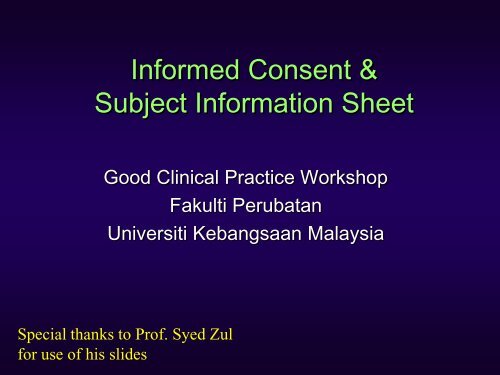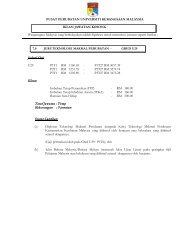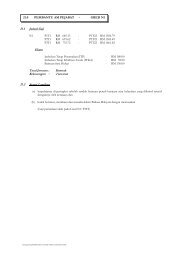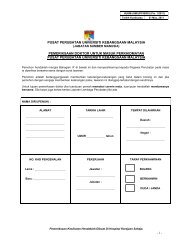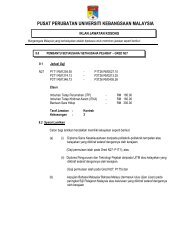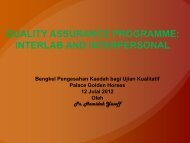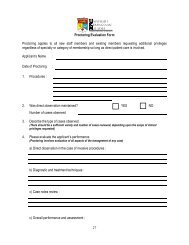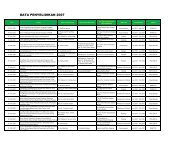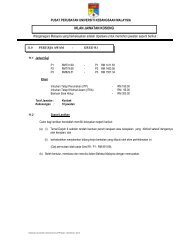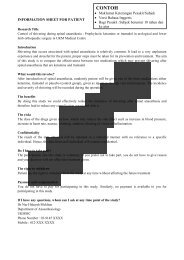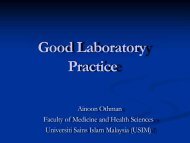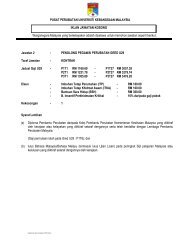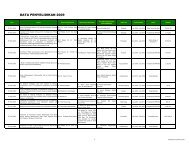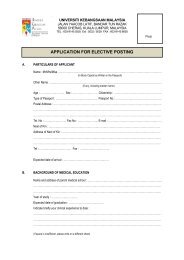Informed Consent & Patient Information Sheet - UKM Medical Centre ...
Informed Consent & Patient Information Sheet - UKM Medical Centre ...
Informed Consent & Patient Information Sheet - UKM Medical Centre ...
You also want an ePaper? Increase the reach of your titles
YUMPU automatically turns print PDFs into web optimized ePapers that Google loves.
<strong>Informed</strong> <strong>Consent</strong> &Subject <strong>Information</strong> <strong>Sheet</strong>Good Clinical Practice WorkshopFakulti PerubatanUniversiti Kebangsaan MalaysiaSpecial thanks to Prof. Syed Zulfor use of his slides
Contents• Why do we need <strong>Informed</strong> <strong>Consent</strong>?• <strong>Consent</strong> Process• <strong>Informed</strong> <strong>Consent</strong> Documents– <strong>Patient</strong> <strong>Information</strong> <strong>Sheet</strong>– <strong>Consent</strong> form• Translation• Witnesses<strong>Informed</strong> <strong>Consent</strong> GCP Workshop
Why do we need <strong>Informed</strong> <strong>Consent</strong>?
Ethical principle of Autonomy• The ethical principle of respect for personsand autonomy requires that subjects begiven the opportunity to choose what shalland shall not happen to them• Sources of reference1. Nuremberg Code2. Declaration of Helsinki<strong>Informed</strong> <strong>Consent</strong> GCP Workshop
<strong>Consent</strong> Process
<strong>Consent</strong> ProcessA process by which a subjects voluntarilyconfirms his/her willingness toparticipate in a particular trialafterhaving been informed of all aspects of thetrial that are relevant to the subject‟sdecision to participate<strong>Informed</strong> <strong>Consent</strong> GCP Workshop
<strong>Informed</strong> consent process• For research to be ethical, individuals should maketheir own decision about whether they want toparticipate or continue participating in research.• This is done through a process of informed consent inwhich individuals– (1) are accurately informed of the purpose,methods, risks, benefits, and alternatives to theresearch,– (2) understand this information and how it relatesto their own clinical situation or interests, and– (3) make a voluntary decision about whether toparticipate.<strong>Informed</strong> <strong>Consent</strong> GCP Workshop
Declaration of Helsinki:“ When obtaining informed consent for theresearch project the physician should beparticularly cautious if the subject is in adependent relationship to him or her or mayconsent under duress. In that case theinformed consent should be obtained by aphysician who is not engaged in theinvestigation and who is completelyindependent of this official relationship. ”<strong>Informed</strong> <strong>Consent</strong> GCP Workshop
Coercion & Undue Influence• Coercion– Intentional use of a credible and severe threatof harm / force to control another or to compelhim or her to do something• Undue influence– When the payment is so large as to induceprospective subjects to consent to participatein the research against their better judgement<strong>Informed</strong> <strong>Consent</strong> GCP Workshop
Coercion & Undue InfluenceAvoid Saying:• This is the latest treatment and you‟ll be oneof the early birds to receive it.• In addition to the expensive free drugs, you‟llget special medical care and even paymentfor each visit• Don‟t worry about the risks, anyway „life is fullof risks‟• I know you are a bit hesitant but I want you tosign up today as I‟ll be away after that<strong>Informed</strong> <strong>Consent</strong> GCP Workshop
<strong>Informed</strong> <strong>Consent</strong> DocumentsSubject <strong>Information</strong> <strong>Sheet</strong><strong>Consent</strong> form
Subject <strong>Information</strong> <strong>Sheet</strong>• <strong>Information</strong> : Pertinent & Relevant• What? When? Why? Where? Who?……<strong>Informed</strong> <strong>Consent</strong> GCP Workshop
What? When? Why? Where? Who?• What is the purpose of the trial?• What is my role in the clinical trial?• How long has the study been running?• How many other people in the trial?• How long will the study last?• What test are involved?• Do I have to be hospitalized?• What is likely to happen to my condition with orwithout treatment?• How could the study effect my daily life?• What are the possible side effects?• What happens if I change my mind aboutparticipating in the trial?<strong>Informed</strong> <strong>Consent</strong> GCP Workshop
CIOMS Guidelines1: Ethical justification and scientific validity of biomedicalresearch involving human beings2: Ethical review committees3: Ethical review of externally sponsored research4: Individual informed consent5: Obtaining informed consent: Essential information forprospective research subjects6: Obtaining informed consent: Obligations of sponsorsand investigators7: Inducement to participate<strong>Informed</strong> <strong>Consent</strong> GCP Workshop
CIOMS Guidelines (2)8: Benefits and risks of study participation9: Special limitations on risk when research involvesindividuals who are not capable of giving informedconsent10: Research in populations and communities withlimited resources11: Choice of control in clinical trials12: Equitable distribution of burdens and benefits in theselection of groups of subjects in research13: Research involving vulnerable persons14: Research involving children<strong>Informed</strong> <strong>Consent</strong> GCP Workshop
CIOMS Guidelines (3)15: Research involving individuals who by reason ofmental or behavioural disorders are not capable ofgiving adequately informed consent16: Women as research subjects17: Pregnant women as research participants18: Safeguarding confidentiality19: Right of injured subjects to treatment andcompensation20: Strengthening capacity for ethical and scientificreview and biomedical research21: Ethical obligation of external sponsors to providehealth-care services<strong>Informed</strong> <strong>Consent</strong> GCP Workshop
<strong>Informed</strong> consent and Federal regulationsRequire 8 elements be included :• 1) Purpose and duration of participation• 2) Risks• 3) Alternatives• 4) Benefits• 5) Confidentiality of records• 6) Compensation for injuries• 7) Person to contact for answers to questions• 8) Voluntariness and right to withdraw<strong>Informed</strong> <strong>Consent</strong> GCP Workshop
Waiver of <strong>Informed</strong> <strong>Consent</strong>The following would qualify:1. Non-human subject research2. Retrospective study based entirely on medical record– Provided records are not identifiable3. Registry or large-scale non-interventional populationstudy qualifies because data collection only byabstraction from medical or lab records (no interactionbut do collect identifiable private info), minimal risk,impracticality.<strong>Informed</strong> <strong>Consent</strong> GCP Workshop
<strong>Information</strong> <strong>Sheet</strong> – In Lay Terms• “To the degree subjects are capable, they should begiven the opportunity to choose what shall or shall nothappen to them”. (The Belmont Report)– Aim for Form 4 level– AVOID cut & paste from your review• Extra protections for those with limitedcapacity to consent.– All studies involving vulnerable groups will needfull ethics review.<strong>Informed</strong> <strong>Consent</strong> GCP Workshop
Introduction• Trial involves research• Plain language• Reason subject invited to participateParticipation in a previous projectOther reasons<strong>Informed</strong> <strong>Consent</strong> GCP Workshop
Introduction : Wording such as:• "You are being invited to take part in a researchstudy. Taking part in this study is entirelyvoluntary and up to you to decide.• Before you make your decision, it is important foryou to understand why the research is beingdone and what it would involve.• Please take as much time as you need to readthe following information carefully and discuss itwith friends, relatives and your doctor if you wish.Ask us if there is anything that is not clear or ifyou would like more information."<strong>Informed</strong> <strong>Consent</strong> GCP Workshop
Wording such as:• "It is your decision whether or not to take part.If you decide to take part you can stillwithdraw at any time, without giving a reason.If you decide not to participate, or decide laterto withdraw, it will not affect the standard offurther care you would receive.• If you do decide to take part you will be askedto sign a consent form. You will be given thisinformation sheet to keep and you will receivea copy of your signed consent form."<strong>Informed</strong> <strong>Consent</strong> GCP Workshop
Emphasis• Participation is voluntary• May refuse to participate• May withdraw at any time• Without penalty or loss of benefits• Without affecting future medical care<strong>Informed</strong> <strong>Consent</strong> GCP Workshop
Background• Purpose of the study– Aim /purpose in plain language• Describe the study– Numbered or bulleted list<strong>Informed</strong> <strong>Consent</strong> GCP Workshop
Readability / comprehension• If any significant information about the study drugbecomes available during your participation, and thatinformation might affect your willingness to continuein the study, the doctor in charge of the study will tellyou about it.– (Form 5)• If we find out anything new about the study drug whileyou are in the study, we will let you know. This willhelp you decide if you would like to continue.– Standard 6<strong>Informed</strong> <strong>Consent</strong> GCP Workshop
What does the trial involve?• Total duration of the study• Number of clinic visits required• Duration of visits if they are long• Diagnostic tests– Blood – how often & how much volume– Imaging – what, how often• Procedures during the visit• Contact between visits<strong>Informed</strong> <strong>Consent</strong> GCP Workshop
The trial treatmentWhat it is being tested?• Experimental part– Drug(s), device(s) or procedure(s)• Placebo or comparator• Drug trial (basic info in lay terms)• Previous human experience : results• Method of allocating treatment– Randomisation• ?blinded trial & ?un-blinding<strong>Informed</strong> <strong>Consent</strong> GCP Workshop
What are the possible benefits of takingpart?• Reasonably expected benefits.• Benefits for individual participants– If there are none, declare to the patient• Benefits for the general population<strong>Informed</strong> <strong>Consent</strong> GCP Workshop
Benefit of study - example• What are the benefits of doing thisstudy?– The information derived from this study will help usto determine the appropriate way in relieving painduring the procedure.– This study will greatly enhance our knowledge …..• Benefit to the patient!!<strong>Informed</strong> <strong>Consent</strong> GCP Workshop
What are the possible risks fromparticipation?• Foreseeable risks or inconveniences:• Discomfort of procedures• Emotionally upsetting & uncomfortablequestionsCriterion for inclusion:• "If the patient knew about this possibility,would he/she take it into account indeciding to participate or not?"<strong>Informed</strong> <strong>Consent</strong> GCP Workshop
ConfidentialityWho will see my study records?• Regulatory authority(ies) have direct access• Study monitor• Confidentiality protected + anonymity– Identifying records kept confidential• Period data will be kept• Storage of any videotape, audiotapes etc• Final destination<strong>Informed</strong> <strong>Consent</strong> GCP Workshop
Confidentiality - example• The study will be reported as collectivedata.• No specific reference to any particularindividual will be reported in the study.<strong>Informed</strong> <strong>Consent</strong> GCP Workshop
Study Costs and Reimbursement• Anticipated expenses to the subject• Level of any reimbursement• Anticipated prorated paymentWording such as:A common wording is: "All study tests, examinationsand medical care required, as part of this study, areprovided free. Reasonable travelling expensesbetween this clinic and your home will be paid."<strong>Informed</strong> <strong>Consent</strong> GCP Workshop
Sponsorship of the studyFinancial benefits to the investigatorsWording such as:"The study is sponsored by (insert sponsor‟s name)Funds received are expended in gaining the servicesof the doctors, nurses and other staff who conductthe study and in paying for the test, procedures andother services that trial participants receive. Anysurplus funds are used by (name of the department,or centre) for funding other research", might beappropriate.<strong>Informed</strong> <strong>Consent</strong> GCP Workshop
Ethical Approval of the StudyWording such as:"This study will be carried out in a mannerconforming to the principles set out by the"National Statement on Ethical Conduct inResearch involving Humans" and accordingto the Good Clinical Practice Guidelines ofMalaysia. The PP<strong>UKM</strong> Human ResearchEthics Committee has reviewed andapproved the study."<strong>Informed</strong> <strong>Consent</strong> GCP Workshop
Further information & contactsWording such as:"If you have any questions or concerns now orat any time about the study, your safety oryour rights, please ask your doctor, his/herstudy staff. Their numbers are listed below.Chief Investigator : Phone:Co-Investigator : Phone:Research Coordinator : Phone:<strong>Informed</strong> <strong>Consent</strong> GCP Workshop
COREC Guidelines for researchers : <strong>Information</strong> sheets & consent forms Version 2.0 22 november 2005
Who gives and signs the informedconsent form?• Always the patient if he is mentallycapable– <strong>Patient</strong> needs to fill in all details himself• Legal representative– A person or a body authorised underapplicable law to consent on behalf of aprospective subject– When patient cannot give consent<strong>Informed</strong> <strong>Consent</strong> GCP Workshop
Impartial Witness• Required when subject or his legalrepresentative is illiterate• A person independent of the trial• Who cannot be unfairly influenced bypeople involved in the trial• Attends the informed consent process• Reads the informed consentform/patient information sheet<strong>Informed</strong> <strong>Consent</strong> GCP Workshop
Role of impartial witness• Attests that the information in theconsent form was accurately explainedto, and apparently understood by thesubject or the subject‟s legalrepresentative and that consent wasfreely given• The witness, the consent taker and theilliterate subject must share a commonspoken language<strong>Informed</strong> <strong>Consent</strong> GCP Workshop
Some issues• Freedom of consent influenced by– Payment– Free medical care and drugs– Undivided attention– Pressure from family• <strong>Consent</strong> given without understanding of theresearch• Society with absolute trust in doctor• Certain areas skirted over<strong>Informed</strong> <strong>Consent</strong> GCP Workshop
Summary• An informed consent form (ICF) is notjust a piece of paper– It is a whole process– The whole process has to be documented– Signing the informed consent does not waivethe patient‟s rights• The principal investigator is responsiblefor proper consent taking– This task may be delegated to others<strong>Informed</strong> <strong>Consent</strong> GCP Workshop


